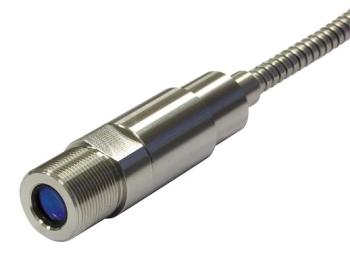Precision sensor manufacturer Micro-Epsilon has extended its range of high performance, non-contact temperature sensors to include a new compact infrared ratio temperature sensor (ratio pyrometer) that is ideal for use in high speed, high temperature environments, including metal processing.
 New thermoMETER CtratioM1 two-colour ratio infrared temperature sensor
New thermoMETER CtratioM1 two-colour ratio infrared temperature sensor
The new thermoMETER CtratioM1 two-colour ratio infrared temperature sensor measures temperatures from 700 deg C up to 1,800 deg C. Due to its rugged sensor head, the thermometer can operate in ambient temperatures up to 250 deg C without requiring any cooling.
The sensor is insensitive to dust, smoke fumes and steam. Using the ratiometric measuring principle, the sensor minimises measurement errors caused by laser intensity changes, low emissivity and partial spot size coverage. Even in cases where the infrared radiation beam is weakened to 95% of its original intensity due to smoke or steam, the ratio pyrometer still provides faultless, reliable measurements.
With an optical resolution of 40:1, a fast response time of 5ms and a short wavelength range of 0.7 to 1.1µm, the thermoMETER CtratioM1 is ideal for measuring high temperatures on metals and for monitoring fast-moving, high-speed production processes. A selectable focus combined with built-in laser aiming enable accurate measurements from a spot size of 1.3mm.
Chris Jones, Managing Director at Micro-Epsilon (UK) Ltd comments: “The thermoMETER CtratioM1 is ideal for companies that need to measure the temperature of metals, metal oxides, ceramic or semiconductor materials in harsh, high temperature environments, including metal casting, welding, forming and sintering. This is another market leading product that technically meets and exceeds the performance of all ratio pyrometers in the marketplace today, with the flexibility of multiple output options and output signal flexibility, from simple analogue to digital and fieldbus interfaces. It also has an extremely attractive price level compared to other ratio pyrometers.”
The fibre optics ratio pyrometer operates on the two-channel measurement principle. Two integrated infrared detection channels with relatively close spacing, but with mutually different measuring wavelengths, produce two independent electrical signals. These signals depend on the infrared radiation emitted from the target and signal components, which are influenced by the optical transmission path between the object and the pyrometer, or from changes of the object if for example, it is moving or changes its size.
By taking the ratio of the two signals, the ratio pyrometer principle eliminates (or averages out) any signal parts that are similar in both channels. The measured temperature of the object therefore only depends on the signal ratio and the emissivity ratio, or ‘slope value’.
When it comes to measuring the temperature of objects with unknown or changing emissivity, the ratio thermometer principle provides extremely accurate results.
The compact sensor head of the ratio pyrometer enables it to be mounted into tight, restricted spaces in production lines and machines. A fibre optic cable connects the optical sensor head to the electronics. The optics and the cable can be used in ambient temperatures of up to 250°C without the need for additional cooling (although a special cooling jacket option is available for ambient temperatures up to 315 deg C). By using a fibre optic cable, the device is insensitive to electromagnetic interference (EMI) normally found in induction-based heat treatment processes.
In order to adapt the sensor to different measurement tasks, the pyrometer offers a choice of a one- or two-channel (ratio pyrometer mode) device, which enables the user to select the most appropriate one without having to purchase additional infrared sensors.
The electronics enable the programming of the sensor, display of temperature measurements and easy wiring of the analogue outputs 0/4-20mA and 0-5/10V for the transmission of signals into industrial control cabinets. To facilitate network integration, Micro-Epsilon offers an optional integrated Profibus DP interface or other plug-in digital interfaces including USB, RS232, RS485, CANbus or Ethernet. Programmable signal processing ensures complete flexibility for different production processes.
Micro-Epsilon also offers its user-friendly software that provides graphical interface and display, the logging of temperature readings of all output channels and signal characteristics over time. The user can also configure parameters and set up alarms such as ‘dirty lens’ alarms.